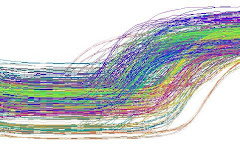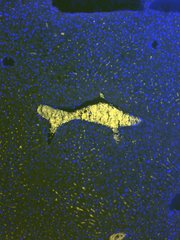Friday, December 19, 2008
Monday, December 15, 2008

As part of a massive, ongoing renovation, MoDOT closed (completely) the West half of Interstate-64, the main artery running through the central corridor of St Louis County. Yesterday, before the ribbon cutting ceremony that simultaneously opened the West half and closed the East half, MoDOT opened the new highway to pedestrian traffic only. "Let's go walk on the new highway" was The holiday event this year.
Thursday, October 23, 2008
And here is Walt's response:
Very nice!
I love the good ol’ early eighties abandoned warehouses.
That would be Paul playing Andy’s bass. Interestingly, I wonder if Paul is also left handed as is the bass – he makes a pretty convincing left paw if he ain’t.
I guess Andy was too be busy being moody and the bass would have covered up that tie – I’m glad he did his side-step-in-one-place-dance towards the end though.
To explain, we both loved OMD back in the early '80s, and stuck with the band after the horror that was "If You Leave". We all went to a concert on their "Crush" Tour and got invited back to the Tour Bus to hang out with the band, so watching the video is much more personal. Andy McCluskey, singing in the video, plays the bass and Paul Humphreys plays keyboards, so we were shocked and amused to see Paul riffing out Andy's bass line. Andy and Paul were huge Kraftwerk fans - as were we - and the band's earlier work fills that same space in electronic music history between the Moog and the Emulator. Other old videos I found are their first, "Electricity" (based loosely on Kraftwerk's "Radioactivity"), the live version of "Enola Gay" from Urgh! A Music War, the Scandinavian epic that is "Maid of Orleans", and the great-tune-turned-silly-video "Telegraph". Love that YouTube!
Monday, October 06, 2008
Wednesday, September 24, 2008
I also enjoy seeing Monadnock as the Word-of-the-day, because its etymology has always bothered me. According to Wordsmith, Mount Monadnock is "a peak in New Hampshire, whose name in Algonquian means isolated mountain." What bothered me was that monad in English meant "a single, isolated unit" and knock in English meant "hill", so somehow the Algonquian and English languages had undergone some sort of crazy convergent evolution culminating in a single word, Monadnock, that meant the same thing in both languages. So today, I did some research and found, "Algonquian Names of Some Mountains and Hills" by William Wallace Tooker in The Journal of American Folklore, Vol. 17, No. 66 (Jul. - Sep., 1904), pp. 171-179 (available through JSTOR). Tooker says:
man, or mon, is a significant prefix to many word combinations... meaning "wonderful," "wonder," "vision," "revelation," "marvellous," etc. It is from the primary verbal root -an, "surpassing," "going beyond," "is more than the common," with the indefinite impersonal m prefix added, which with its generic -adn, "mountain," and the locative -ock, "place," gives as a synthesis of Man-adn-ock, "land or country of the surpassing mountain."
So, Monadnock is the land of the wondrous mountain, and Mt. Monadnock is the mountain of the land of the wondrous mountain; and the colonists who first heard the locals call the area Man-adn-ock probably felt the same sense of linguistic convergence as I did and assumed Monad-knock was Algonquian for isolated hill.
Next post: as a child I spent a week at the Grand Tetons...
Monday, September 15, 2008
 As I replied to Ned, I find it strangely disturbing — those parts of my brain normally don't talk much, so listening to the mashup was like a roadtrip with my father-in-law.
As I replied to Ned, I find it strangely disturbing — those parts of my brain normally don't talk much, so listening to the mashup was like a roadtrip with my father-in-law.
Tuesday, August 19, 2008
Friday, July 25, 2008
I had recently been wasting my free time doing the memory games at Sporcle, and could not for the life of me complete the Periodic Table. One of the elements that I always miss is Tantalum – Niobium I could remember, but Tantalum I couldn't. To my Western eyes, it was just another one of those forgettable transition elements in the wasteland between chemistry and nuclear physics – if you can find a use for it, good for you. To East Africa, it's a reason to go to war. As small as the world has become in terms of information and economics, we are all still pretty provincial in terms of information and economics. I won't forget Tantalum, next time I'm looking at the Periodic Table, but more importantly, the table looks different now; where else are suffering and injustice hiding in that pretty wallchart?
Thursday, June 19, 2008
Wednesday, June 11, 2008
The monkeys grasp this 'money' concept despite the fact that their lineage diverged from that of humans about 35 million years ago. “It’s quite surprising to find such an ability in a monkey species that is so [evolutionarily] distant from humans,” says Addessi.
Previous studies have focused on similar skills in great apes such as chimpanzees. But this is among the first to assess symbolic reasoning in a species so distantly related to ourselves.
I'm still reeling when I read that! And, I know the gross majority of people, scientists and non-scientists alike, would be puzzled by my reaction. Here's the thing: since when is money genetic? What in the #&$@ does the genetic ("evolutionary") distance between humans and Capuchins have anything to do with social behaviors? The implication is that this sets the origins of money back at least 35 million years to our last common fiscal ancestor. It suggests that barter is some higher order behavior limited to an elite few primate clades, and not a fundamental aspect of inter-individual interaction. This seems similar to the revelation decades ago that other social organisms practiced altruism; how can a group of individuals function socially without a drive toward a greater good, without a desire to help other members, without exchange? Bees dance to tell other workers where the flowers are, and the other workers use "symbolic reasoning" to find them. OK, maybe that's going too far, but the whole genetics-explain-everything mentality of the current scientific age tends to get under my skin.
Oh, and here's what else Nature had to add:

Wednesday, March 26, 2008
Pay special attention to the newscrawl at the bottom of the screen — the Onion's forte seems to be headlines moreso than long content.






